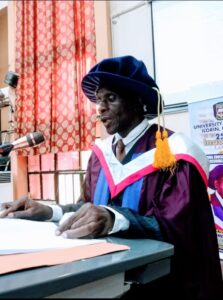

By correspondent in Ilorin.

A Don, Prof. Yunus Fasasi,has urged stakeholder in education sector in Nigeria,including government agencies, supervisors, and parents, among others to identify and perform their duties appropriately, rather than playing the blame game.
Prof. Fasasi of the Department of Educational Management, Faculty of Education, University of Ilorin, gave the advice at the 256th Inaugural Lecture of the University with the theme, “Holding Education Accountable for Resources and Results”, held at the University auditorium on Friday.
The university lecturer,who said that all stakeholders had complementary roles to play towards successful implementation of educational programmes and achievement of educational objectives, stressed the need for stakeholders to stop blame game and ensure that duration in schools for each level is enforced as contained in the nation’s educational policy.
The Don, said that admission of students who skipped stages usually poses serious challenges. added that it also had implications for output in terms of employability, pointing out that education is not a mere acquisition of knowledge and language.
“He said: “Therefore, they should stop pointing fingers, assigning faults, and shifting responsibilities to one another for the failure in the educational system.
“The goal of continuous nine-year basic education is to ensure that Nigerian citizens acquire the necessary life skills to become self-reliant and contribute to the development of society.
“Many school pupils are in the habit of entering primary schools before the officially approved age, while many move to another stage without waiting to complete the previous school, especially in private schools.
“The same practice occurs in senior secondary schools where many pupils decide to take SSCE examinations at SS2.
“The physical, mental, social, and emotional development of the pupils is affected while their admission poses challenges.”
The Don stressed the need for existing government and private institutions, in the country, to be adequately funded to enable them actualize the nation’s educational objectives.
He noted that the carrying capacity of schools should always be considered before determining the number of students to be admitted into any institution, saying that large-size schools and classrooms without corresponding facilities tend to complicate administrative and supervisory duties.
Prof. Fasasi noted that the proliferation of educational institutions did not translate to national development.
Edited by Dawud Ahmed.


